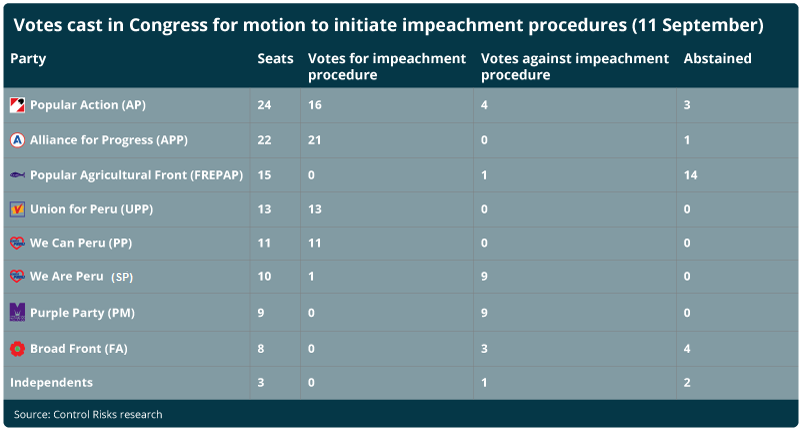18 de Septiembre del 2020
Main findings
- Vizcarra is unlikely to be impeached by Congress due to insufficient votes, judicial checks and balances, and broad public support.
- Relations between the executive and legislative branches will remain strained for the remainder of Vizcarra’s term (until July 2021), and Congress is likely to censure cabinet ministers.
- Companies operating in Peru will remain exposed to heightened political uncertainty in the two-year outlook, including persistent risks of abrupt regulatory changes and political interference.
Impeachment unlikely
Opposition members of Congress on 11 September voted to initiate impeachment procedures against Vizcarra, arguing that he is “morally unfit” for office. The vote followed Senator Edgar Alarcón’s release on 9 September of conversations between the president and his aides regarding popular music artist Richard Cisneros. The origin, veracity, and legality of the audio recordings are unclear, but public controversy regarding Cisneros’ contracts with the Ministry of Culture between 2017 and 2020 have fuelled Congressional scrutiny since May 2020. The Ministry hired Cisneros several times to deliver motivational speeches, for a total of USD 50,000. Critics claim that Cisneros is not qualified for the task, and argue that he received the contracts due to his political support for Vizcarra.
Despite strong animosity towards Vizcarra in Congress, the 130-seat unicameral body is splintered among nine political groups that do not vote consistently along party lines and have proven unable to organize reliable coalitions.

The opposition is unlikely to secure the 87 votes required to oust Vizcarra. The 11 September motion to move ahead with the process was approved by 65 votes (52 were needed to initiate the process), and support for impeachment has eroded since. Leaders of the two largest parties, Popular Action (AP) and Alliance for Progress (APP), stated on 12 and 13 September that they no longer intend to oust Vizcarra. The TC is highly likely to step in on 17 September, either delaying or invalidating the motion for failing to comply with constitutional due process.
Persistent tension
Relations between Vizcarra’s government and the legislature are unlikely to improve during the final months of his term. The government has dismissed the legislative’s impeachment procedures as illegitimate and contrary to the Constitution. Minister of Justice Ana Neyra on 12 September stated that attempts by Congress President Manuel Merino to secure the military’s support for impeachment ahead of the vote were “akin to sedition”. Congress will continue to oppose parts of Vizcarra’s agenda, particularly with regard to anti-corruption reforms and cabinet ministers. Minister of the Economy and Finance María Alva on 15 September survived a congressional censure vote due to criticism of the government’s pandemic response, but other cabinet members are less likely to resist strong congressional scrutiny.
Business implications
Businesses operating in the country will remain exposed to persistent uncertainty and periodic threats of abrupt changes in the political environment for the remainder of Vizcarra’s term. The risk of political interference will also remain heightened until the end of the legislature in July 2021.













